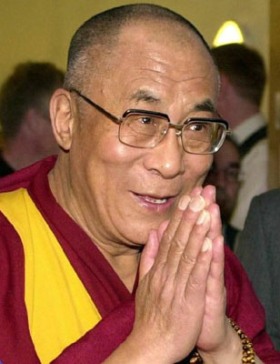Sleep is the best meditation.
Spend some time alone every day.
If you can, help others; if you cannot do that, at least do not harm them.
Happiness is not something ready made. It comes from your own actions.
If you have a particular faith or religion, that is good. But you can survive without it. We can live without religion and meditation, but we cannot survive without human affection.
With realization of one’s own potential and self-confidence in one’s ability, one can build a better world.
Life
Birth: 14th Dalai Lama of Tibet Jetsun Jamphel Ngawang Lobsang Yeshe Tenzin Gyatso is born on 6 July 1935 to Choekyong Tsering and Diki Tsering in Qinghai, China.
Realization: When Tenzin Gyatso (Dalai Lama) was about two years old a search party was sent out to find the new incarnation of the Dalai Lama. After extensive searching, they found that Thondup’s house resembled that in Reting’s vision. They presented Thondup with various relics and toys—some had belonged to the previous Dalai Lama while others had not. It was reported that Thondup correctly identified all items owned by the previous Dalai Lama, exclaiming “That’s mine! That’s mine!”.Thondup was recognized as the reincarnated Dalai Lama and renamed Jetsun Jamphel Ngawang Lobsang Yeshe Tenzin Gyatso (“Holy Lord, Gentle Glory, Compassionate, Defender of the Faith, Ocean of Wisdom”).
Death: Alive
Teaching Style: Dalai Lama use to give teachings throughout the year at various times and in different places. He created a Tibetan educational system in order to teach the Tibetan children the traditional language, history, religion, and culture. He supported the refounding of 200 monasteries and nunneries in an attempt to preserve Tibetan Buddhist teachings and the Tibetan way of life.He opened the Library of Tibetan Works and Archives in Dharamsala which houses over 80,000 manuscripts and important knowledge resources related to Tibetan history, politics and culture which is considered one of the most important institutions for Tibetology in the world.
Fame:Dalai Lama is the spiritual and political leader of the Tibetan people. He is
the head of the Tibetan government-in-exile based in Dharamshala, India. Tibetans traditionally believe him to be the reincarnation of his predecessors. He was awarded the Nobel Peace Prize in 1989.The Dalai Lama is believed to be the current incarnation of a long line of Tulkus, or Buddhist Masters, who have become exempt from the wheel of death and rebirth. These ascended masters have chosen of their own free will to be reborn to this place in order to teach humanity. Today, the Dalai Lama and the office of the Dalai Lama have become focal points in their struggle towards independence and, more urgently, cultural survival. In that role the Dalai Lama has chosen to use peace and compassion in his treatment of his own people and his oppressors.
Legacy: The institution of the Dalai Lama has become, over the centuries, a central
focus of Tibetan cultural identity; a symbolic embodiment of the Tibetan national character. Dalai Lama was proclaimed the tulku or rebirth of the thirteenth Dalai Lama at the age of two.
He is regarded as the principal incarnation of Chenrezig (referred to as Avalokiteshvara in India), the bodhisattva of compassion and patron deity of Tibet.
Teachings
Dalai Lama teaches that balance is a key element of a happy life. A balanced and skillful approach to life, taking care to avoid extremes, becomes a very important factor in conducting one’s everyday existence.’This gentle and skillful approach, taking care to avoid extremes, applies to healthy mental and emotional growth as well.
Dalai Lama believes that happiness can be achieved through compassion and training the mind. From his perspective there is an inextricable link between one’s own personal happiness and kindness and caring and compassion towards others.The first step in seeking happiness is learning. We first have to learn how negative emotions and behaviors are harmful to us and how positive emotions are helpful. We must also realize that these negative emotions are not only very bad and harmful to one personally, but are also harmful to society and the future of the whole world,” teaches Dalai Lama.
Unlike science, the religious tradition teaches the concept of forgiveness, tolerance and compassion. Scientists cannot help you change your emotion, only religion can.
The need for simple human-to-human relationships is becoming increasingly urgent … Today the world is smaller and more interdependent. One nation’s problems can no longer be solved by itself completely. Thus, without a sense of universal responsibility, our very survival becomes threatened. Basically, universal responsibility is feeling for other people’s suffering just as we feel our own. It is the realization that even our enemy is entirely motivated by the quest for happiness. We must recognize that all beings want the same thing that we want. This is the way to achieve a true understanding, unfettered by artificial consideration
According to him this blue planet is our only home, if something goes wrong at the present generation, then the future generations really face a lot of problems, and those problems will be beyond human control; so that’s very serious. Ecology should be part of our daily life.


[…] Dalai LamaHis Holiness The Dalai Lama is among the most popular spiritual leaders on today’s world stage. He has strongly encouraged the scientific study of meditation. […]